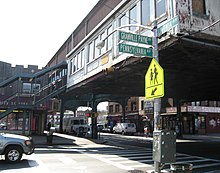Pennsylvania Avenue (IRT New Lots Line)
|
| |||||||||||||||||||||||||||||||||||||||||||||||||||||||||||||||
| Street map |
|---|
The Pennsylvania Avenue station is a station on the IRT New Lots Line of the New York City Subway. Located at the intersection of Pennsylvania and Livonia Avenues in East New York, Brooklyn, it is served by the 3 train at all times except late nights, when the 4 train takes over service. During rush hours, occasional 2, 4 and 5 trains also stop here.
History

The New Lots Line was built as a part of Contract 3 of the Dual Contracts between New York City and the Interborough Rapid Transit Company, including this station. It was built as an elevated line because the ground in this area is right above the water table, and as a result the construction of a subway would have been prohibitively expensive. The first portion of the line between Utica Avenue and Junius Street opened on November 22, 1920, with shuttle trains operating over this route. The line opened one more stop farther to the east to Pennsylvania Avenue on December 24, 1920. At that date, only the southbound platform was used.
While work at New Lots Avenue and at Van Siclen Avenue was practically completed in 1921, they could not open yet because trains could not run to the terminal until track work, the signal tower, and the compressor room were in service. Work began on June 19, 1922, and on October 16, 1922, shuttles began operating between this station and New Lots Avenue. A two-car train operated on a single track on the northbound track. On October 31, 1924, through service to New Lots Avenue was begun.
From April 11, 2016 until September 19, 2016, Saratoga Avenue and Pennsylvania Avenue were closed for renovation. A truck accident on October 27, 2016 damaged the station's mezzanine, so it was closed again for repairs until March 3, 2017. The platforms and tracks were undamaged in the accident.
Station layout
| Platform level | Side platform | |
| Northbound | ← ← ← ← | |
| Center trackway | No track or roadbed | |
| Southbound | | |
| Side platform | ||
| Mezzanine | Fare control, station agent, MetroCard and OMNY machines | |
| Ground | Street level | Exit/entrance |
This elevated station has two side platforms and two tracks with space for a center track that was never installed. Both platforms have beige windscreens and brown canopies with green support frames and columns that run along the entire length except for a small section at the extreme west (railroad north) end. Here, there are only waist-high black steel fences. The station name plates are in the standard black with white lettering. The platforms are slightly longer than the standard IRT train length of 514 feet (157 m).
Exits
The station's only entrance/exit is an elevated station house beneath the tracks. Inside fare control, there is a turnstile bank, waiting area that allows a free transfer between directions, and a single staircase to each platform at their extreme east (railroad south) ends. Outside fare control, there is a token booth and two staircases going down to the northeast and southwest corners of Pennsylvania and Livonia Avenues. The landing on the south side of the station house has an exit-only turnstile to allow passengers on New Lots Avenue-bound trains to exit the station without having to go through the station house. The exterior of the station house, including the staircase canopies, doors, and fences were painted red in July 2009.
References
- ^ "Glossary". Second Avenue Subway Supplemental Draft Environmental Impact Statement (SDEIS) (PDF). Vol. 1. Metropolitan Transportation Authority. March 4, 2003. pp. 1–2. Archived from the original (PDF) on February 26, 2021. Retrieved January 1, 2021.
- ^ "Annual Subway Ridership (2018–2023)". Metropolitan Transportation Authority. 2023. Retrieved April 20, 2024.
- ^
- "2 Subway Timetable, Effective June 26, 2022". Metropolitan Transportation Authority. Retrieved December 16, 2024.
- "3 Subway Timetable, Effective June 30, 2024". Metropolitan Transportation Authority. Retrieved December 16, 2024.
- "4 Subway Timetable, Effective December 15, 2024". Metropolitan Transportation Authority. Retrieved December 16, 2024.
- "5 Subway Timetable, Effective December 15, 2024". Metropolitan Transportation Authority. Retrieved December 16, 2024.
- ^ "Nearly 70 Track Miles to Be Added To Rapid Transit Facilities in 1920". Brooklyn Standard Union. December 28, 1919. Retrieved August 14, 2016 – via Fulton History.
- ^ "Differ Over Assessment Plans in Transit Projects: Eastern Parkway Subway and Livonia Avenue Extension the Cause of Bitter Dissension Among Property Owners Uptown". The Daily Standard Union. March 13, 1910. Retrieved August 14, 2016 – via Fulton History.
- ^ "Annual report. 1920-1921". HathiTrust. Interborough Rapid Transit. Retrieved September 5, 2016.
- ^ Cunningham, Joseph; DeHart, Leonard O. (1993). A History of the New York City Subway System. J. Schmidt, R. Giglio, and K. Lang. p. 53.
- ^ Annual Report. J.B. Lyon Company. 1922.
- ^ Commission, New York (State) Transit (1922). Annual Report ... J.B. Lyon Company.
- ^ "IRT Brooklyn Line Opened 90 Years Ago". New York Division Bulletin. 53 (9). New York Division, Electric Railroaders' Association. September 2010. Retrieved August 31, 2016 – via Issu.
- ^ "The Stations Were Closed for Renewal Work Since April". mta.info. Metropolitan Transportation Authority. September 16, 2016. Archived from the original on September 18, 2016. Retrieved August 28, 2019.
- ^ "Pennsylvania Av 3 Line Station Re-opens". mta.info. Metropolitan Transportation Authority. March 3, 2017. Archived from the original on March 4, 2017. Retrieved August 28, 2019.
- ^ Dougherty, Peter (2006) [2002]. Tracks of the New York City Subway 2006 (3rd ed.). Dougherty. OCLC 49777633 – via Google Books.
- ^ "MTA Neighborhood Maps: East New York" (PDF). mta.info. Metropolitan Transportation Authority. 2015. Retrieved July 19, 2015.
External links
 Media related to Pennsylvania Avenue (IRT New Lots Line) at Wikimedia Commons
Media related to Pennsylvania Avenue (IRT New Lots Line) at Wikimedia Commons- nycsubway.org – Brooklyn IRT: Pennsylvania Avenue
